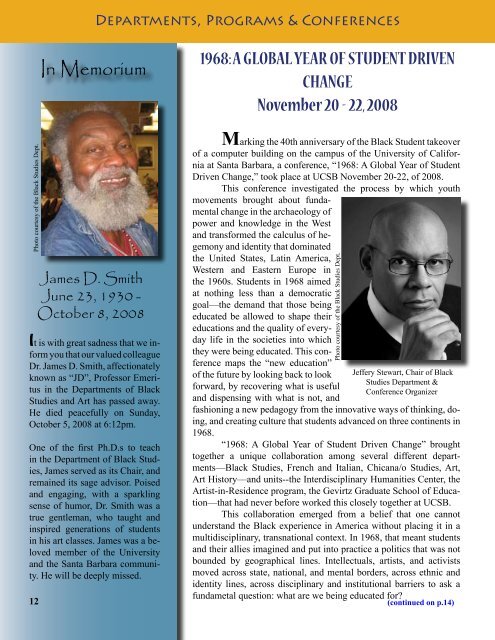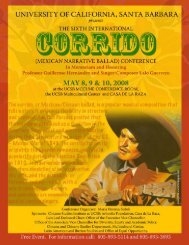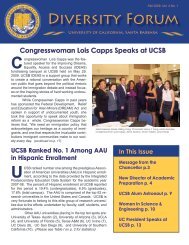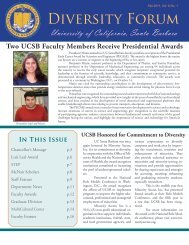Fall 2008 - Diversity, Equity, and Academic Policy - University of ...
Fall 2008 - Diversity, Equity, and Academic Policy - University of ...
Fall 2008 - Diversity, Equity, and Academic Policy - University of ...
You also want an ePaper? Increase the reach of your titles
YUMPU automatically turns print PDFs into web optimized ePapers that Google loves.
Departments, Programs & Conferences<br />
In Memorium<br />
1968: A GLOBAL YEAR OF STUDENT DRIVEN<br />
CHANGE<br />
November 20 - 22, <strong>2008</strong><br />
Photo courtesy <strong>of</strong> the Black Studies Dept.<br />
12<br />
James D. Smith<br />
June 23, 1930 -<br />
October 8, <strong>2008</strong><br />
It is with great sadness that we inform<br />
you that our valued colleague<br />
Dr. James D. Smith, affectionately<br />
known as “JD”, Pr<strong>of</strong>essor Emeritus<br />
in the Departments <strong>of</strong> Black<br />
Studies <strong>and</strong> Art has passed away.<br />
He died peacefully on Sunday,<br />
October 5, <strong>2008</strong> at 6:12pm.<br />
One <strong>of</strong> the first Ph.D.s to teach<br />
in the Department <strong>of</strong> Black Studies,<br />
James served as its Chair, <strong>and</strong><br />
remained its sage advisor. Poised<br />
<strong>and</strong> engaging, with a sparkling<br />
sense <strong>of</strong> humor, Dr. Smith was a<br />
true gentleman, who taught <strong>and</strong><br />
inspired generations <strong>of</strong> students<br />
in his art classes. James was a beloved<br />
member <strong>of</strong> the <strong>University</strong><br />
<strong>and</strong> the Santa Barbara community.<br />
He will be deeply missed.<br />
Marking the 40th anniversary <strong>of</strong> the Black Student takeover<br />
<strong>of</strong> a computer building on the campus <strong>of</strong> the <strong>University</strong> <strong>of</strong> California<br />
at Santa Barbara, a conference, “1968: A Global Year <strong>of</strong> Student<br />
Driven Change,” took place at UCSB November 20-22, <strong>of</strong> <strong>2008</strong>.<br />
This conference investigated the process by which youth<br />
movements brought about fundamental<br />
change in the archaeology <strong>of</strong><br />
power <strong>and</strong> knowledge in the West<br />
<strong>and</strong> transformed the calculus <strong>of</strong> hegemony<br />
<strong>and</strong> identity that dominated<br />
the United States, Latin America,<br />
Western <strong>and</strong> Eastern Europe in<br />
the 1960s. Students in 1968 aimed<br />
at nothing less than a democratic<br />
goal—the dem<strong>and</strong> that those being<br />
educated be allowed to shape their<br />
educations <strong>and</strong> the quality <strong>of</strong> everyday<br />
life in the societies into which<br />
they were being educated. This conference<br />
maps the “new education”<br />
<strong>of</strong> the future by looking back to look<br />
forward, by recovering what is useful<br />
<strong>and</strong> dispensing with what is not, <strong>and</strong><br />
Jeffery Stewart, Chair <strong>of</strong> Black<br />
Studies Department &<br />
Conference Organizer<br />
fashioning a new pedagogy from the innovative ways <strong>of</strong> thinking, doing,<br />
<strong>and</strong> creating culture that students advanced on three continents in<br />
1968.<br />
“1968: A Global Year <strong>of</strong> Student Driven Change” brought<br />
together a unique collaboration among several different departments—Black<br />
Studies, French <strong>and</strong> Italian, Chicana/o Studies, Art,<br />
Art History—<strong>and</strong> units--the Interdisciplinary Humanities Center, the<br />
Artist-in-Residence program, the Gevirtz Graduate School <strong>of</strong> Education—that<br />
had never before worked this closely together at UCSB.<br />
This collaboration emerged from a belief that one cannot<br />
underst<strong>and</strong> the Black experience in America without placing it in a<br />
multidisciplinary, transnational context. In 1968, that meant students<br />
<strong>and</strong> their allies imagined <strong>and</strong> put into practice a politics that was not<br />
bounded by geographical lines. Intellectuals, artists, <strong>and</strong> activists<br />
moved across state, national, <strong>and</strong> mental borders, across ethnic <strong>and</strong><br />
identity lines, across disciplinary <strong>and</strong> institutional barriers to ask a<br />
fundametal question: what are we being educated for?<br />
Photo courtesy <strong>of</strong> the Black Studies Dept.<br />
(continued on p.14)






